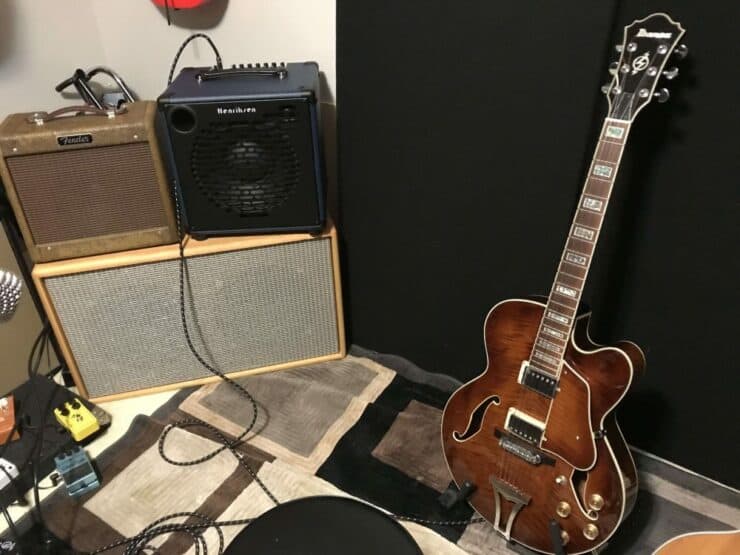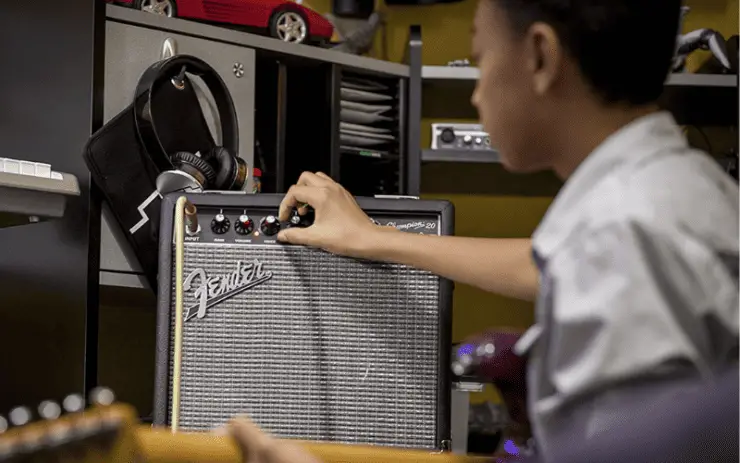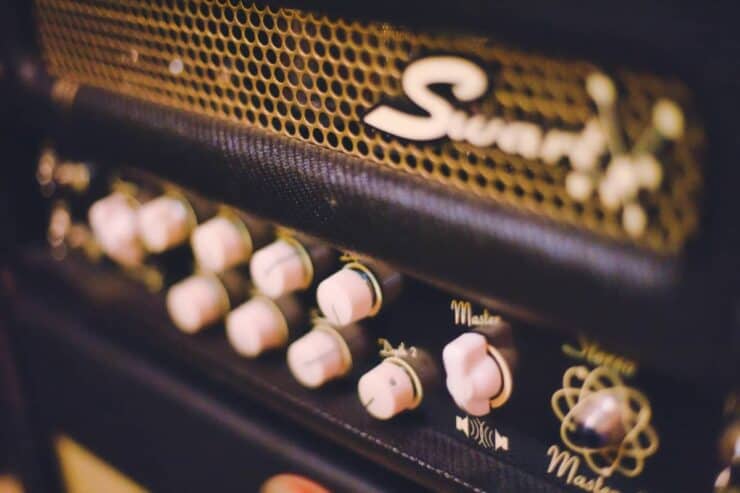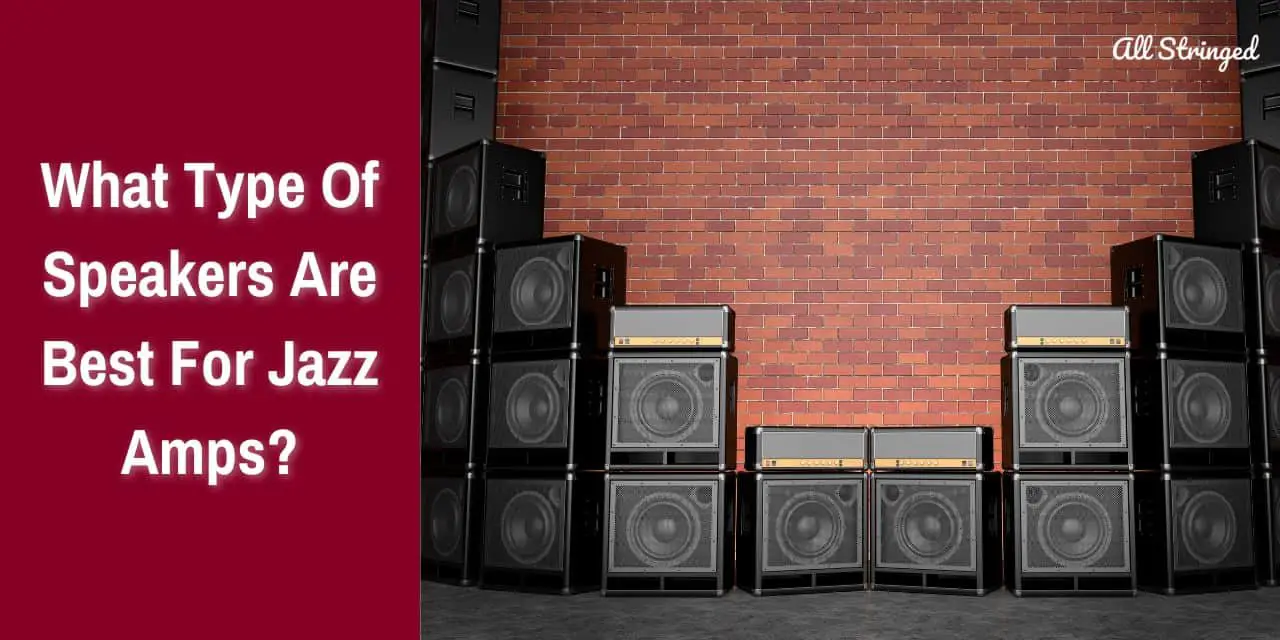Are you a jazz guitar player looking for the perfect sound? Do you want to know what type of speakers you should use with your jazz amp? Look no further! In this article, we discuss the different types of speakers and what makes them ideal for jazz amps. We also share some tips on how to choose the right speakers for your jazz amp. With the information in this article, you’ll be able to get the perfect sound for your jazz guitar playing. So, keep reading to find out what type of speakers are best for jazz amps!
What do you mean by a jazz amp?
In the world of music, very few genres evoke the same level of sophistication, emotion, and improvisational prowess as jazz music. As one of the most revered and versatile genres, jazz demands a well-defined approach to sound production. This is where jazz amps come into the picture for musicians and guitarists. With its unique characteristics and sonic capabilities, the jazz amplifier serves as a conduit through which musicians and guitarists can channel their creativity and craft a distinctive musical experience.
At its core, a jazz amp is an amplification system tailored to suit the nuances of jazz guitar playing. Unlike amps used in rock, metal, or blues genres, jazz amps emphasize clean and transparent tones that provide a balanced canvas for intricate chord voicings, melodic phrasing, and improvisation. The primary goal of a jazz amp is to reproduce the natural sound of the guitar with clarity, fidelity, and warmth, allowing the guitarist’s skill and expression to shine through.
>>> Click here to read our review about the Top 15 Best Jazz Amps <<<
The roots of jazz amplification can be traced back to the 1930s and 1940s when guitarists like Charlie Christian and Eddie Durham used amps for projecting their instruments in big band settings. These early amps laid the foundation for the clean and warm jazz guitar sound that would become iconic. Over the years, guitarists like Joe Pass, Jim Hall, and Wes Montgomery further solidified the connection between jazz music and amps that prioritize clarity and tonal purity.
In today’s music landscape where technology has given rise to a plethora of amp options, jazz amps continue to hold their own unique place. Modern jazz guitarists might choose from a variety of amps that pay homage to the classic models while incorporating modern features like digital effects, direct recording capabilities, and improved portability. These amps preserve the essence of the traditional jazz sound while accommodating the needs of contemporary players.
Key characteristics of jazz amps
The world of music is a diverse and ever-evolving landscape, with each genre demanding unique sonic qualities to capture its essence. When it comes to jazz music, the choice of amp becomes important for musicians and guitarists. A jazz amp isn’t just an instrument of amplification but it is also a vessel through which the guitarist’s musical expression flows. There are certain key features of jazz amps that make it unique and an indispensable tool for a jazz guitarist.

Clean and transparent tone
The hallmark of a jazz amp is its ability to produce a clean and transparent tone. Unlike amps used in rock or metal, where distortion and overdrive are key components, a jazz amp focuses on delivering a pristine sound that faithfully reproduces the natural timber of the guitar. This clean canvas is important for highlighting the complexity of jazz chords, allowing them to ring out with clarity and precision.
Warmth and richness
Jazz music often features intricate chord progressions and extended harmonies. A jazz amp should offer a warm and rich tonal palette that enhances the depth of these chords. This warmth adds a sense of fullness to the sound, allowing each note to resonate and interact harmoniously with others. This characteristic is particularly important for solo performances and intimate jazz combos.
Dynamic response
Jazz guitarists are known for their dynamic playing, seamlessly shifting between soft, understated passages and moments of expressive intensity. A quality jazz amp responds to the guitarist’s touch, translating variations on picking technique into nuanced changes in volume and tone. This dynamic responsiveness into nuanced changes in volume and tone. The dynamic responsiveness is important for conveying the emotional subtleties that define jazz music.
Reverb and ambiance
Reverb is a key component of a jazz amp’s character. It adds a sense of space and ambiance to the sound, creating an immersive environment that complements the genre’s atmospheric qualities. Jazz amps often feature spring reverb, known for its vintage charm and ability to add dimension to the sound without overwhelming it.
EQ flexibility
While the focus of a jazz amp is on clean tones, having a flexible EQ section is still important. Jazz guitarists might have to make subtle adjustments to tailor their sound to different playing environments or accompaniments. An adjustable EQ will allow you to fine-tune their tone without compromising the amp’s fundamental characteristics.
Focus on instrumental nuances
Jazz guitarists rely heavily on intricate phrasing, subtleties of articulation, and the interplay between notes. A jazz amp is designed to capture and convey these nuances faithfully. This ability allows the guitarist to communicate their musical ideas with precision, whether playing solo or in an ensemble.
Different types of speakers for jazz amps
In the intricate world of music, where every note and tone carries nuanced significance, the choice of equipment becomes a meticulous endeavor. For jazz guitarists, the search for the perfect amp setup involves a deep exploration of tone, resonance, and expression. Among the key components that shape their sonic landscape, the choice of speaker stands as a pivotal decision. There are different types of speakers available in the market, uncovering how they contribute to the unique jazz sound.
Open-back speakers
The open-back speaker configuration is a design choice that has been embraced across various musical genres, including jazz. Characterized by a speaker enclosure with an exposed rear, open-back speakers exude an airy and ambient quality that has captivated jazz enthusiasts for decades.
Open-back speakers are known for their ability to create a sense of spatial resonance. The rear opening allows sound waves to escape from both the front and back of the speaker cone. This results in a three-dimensional sound dispersion. In jazz settings, this quality complements the genre’s atmospheric and improvisational nature, enhancing the feeling of being immersed in a live performance.
Jazz guitarists have to rely heavily on the midrange frequencies for their intricate chord voicings, melodic lines, and improvisations. Open-back speakers accentuate midrange frequencies, offering enhanced clarity that allows for the distinct articulation of complex harmonies and subtle phrasings.
The design of open-back speakers contributes to a smoother transition between notes and overtones. This characteristic suits the jazz guitarist’s propensity for extended chords and dissonant harmonies as it prevents abrupt tonal changes and maintains a seamless blend of notes.
These speakers often project sound with a lighter touch compared to their closed-back counterparts. This quality is conducive to the delicacy and finesse needed in jazz playing, allowing for nuanced expression without overwhelming the audience.
Closed-back speakers
Closed-back speakers have a different sonic profile that resonates with jazz musicians looking for a particular tonal foundation. With a sealed enclosure behind the speaker cone, closed-back speakers offer distinct advantages that align with the requirements of jazz guitar playing.
Closed-back speakers tend to exhibit a tighter and more controlled low-end response. For jazz guitarists and musicians, this translates to enhanced precision when navigating through intricate bass lines and walking bass patterns.
The sealed nature of closed-back cabinets results in focused sound projection. Jazz musicians and guitarists can exploit this characteristic to achieve precise note articulation and separation, especially when playing complex chord voicings or fast-paced single-note lines.
While open-back speakers prioritize ambiance, closed-back speakers deliver a punchier and more directional projection. The quality is advantageous in situations where the guitarist needs to cut through a mix or play in larger venues where sound dispersion becomes crucial.
The sealed enclosure of closed-back speakers can create a controlled sound environment on stage or in the studio. This predictability is quite useful for jazz musicians and guitarists who value consistency in their performances, allowing them to maintain the same tonal characteristics regardless of the venue.
Ceramic speakers
Ceramic speakers are crafted with advanced materials and engineering and they’ve gained prominence in various musical genres, including jazz. Known for their robustness and clarity, ceramic speakers offer a set of attributes that resonate with jazz guitarists looking to articulate their musical expressions with precision.
Ceramic speakers are revered for their ability to reproduce crisp and clear high frequencies. This characteristic can be highly beneficial in jazz settings where the intricacies of chord voicings and delicate single-note lines need high-end clarity for proper articulation.
These speakers possess a punchier low-end response, contributing to a modern tonal profile that suits contemporary jazz styles. The punchiness can enhance the rhythmic aspect of jazz guitar playing, especially when engaging in chord comping and syncopated patterns.
They are designed to withstand higher power levels. This makes them more suitable for jazz musicians and guitarists who occasionally push their amps to achieve desired dynamics. This durability ensures consistent performance during spirited live performances.
The modern design of ceramic speakers can result in enhanced sound projection, which will be useful when playing in larger venues or with ensembles. The ability to project sound effectively will ensure that the subtleties of jazz guitar playing are communicated to the audience.
Alnico speakers
Alnico (aluminum-nickel-cobalt) speakers evoke a sense of nostalgia and vintage elegance, harking back to the golden era of jazz music. Known for their warm and balanced tonal characteristics, Alnico speakers deliver a distinctive sonic palette that aligns with the traditional roots of jazz guitar playing.
Alnico speakers are cherished for their smooth and warm tonal profile. The even distribution of frequencies lends itself well to the harmonically rich chords and melodic lines that define jazz guitar playing.
The inherent characteristics of Alnico magnets contribute to a vintage tonal vibe that resonates with jazz guitarists who seek to honor the genre’s historical legacy. This vintage warmth can evoke a sense of authenticity in the jazz sound.
Jazz guitarists often rely on the midrange frequencies to convey the intricacies of their playing. Alnico speakers deliver articulate midrange responses, allowing for the delicate nuances of chord voicings and melodic phrasing to shine through.
These speakers are known for their sensitivity to touch and dynamics. This responsiveness can be harnessed to achieve expressive variations in volume and tone, enhancing the guitarist’s ability to convey emotions through their playing.
How to choose the right speaker for your jazz amp?
In jazz music, the choice of the speaker becomes an artful decision that plays a key role in shaping your sonic canvas. Among the different factors that influence your jazz amp’s sound, there are different factors that stand out. Here are some of the factors you must consider when choosing the right speaker for your jazz amp. These elements intertwine to create a harmonious blend that defines your signature jazz sound.
#1. Understand your style
Jazz is a genre with diverse substyles, ranging from classic swing to modern fusion. Your chosen speaker should ideally align with the specific jazz style you’re playing. Are you drawn to the warm tones of traditional jazz or do you lean towards the more contemporary and experimental side of the genre? Identifying your style will help guide you in selecting a speaker that complements the sonic characteristics of your preferred jazz subgenre.
#2. Power rating
The power rating of a speaker reflects its capability to handle your amp’s output without distortion or damage. For jazz guitarists who prioritize clean tones, dynamic expression, and nuanced articulation, understanding power rating will be crucial.
Make sure that the power handling of the speaker aligns with or slightly exceeds your amp’s output power. This balance prevents both underutilization of the speaker’s capabilities and overloading which can result in unwanted distortion.
Jazz music often involves shifts in volume, from delicate chords to expressive solos. Going for a speaker with slightly higher power handling than your amp’s output will provide headroom. This will allow you to explore dynamic playing without sacrificing clarity.
With its emphasis on clean tones, jazz will require speakers that can handle intricate harmonies without muddying the sound. A speaker that operates well within its power range preserves the clean clarity essential to jazz guitar playing.
#3. Frequency response
Frequency response refers to the range of frequencies a speaker is capable of reproducing, from bass to treble. In the context of jazz music, where each note resonates with rich harmonies and intricate melodies, you should consider frequency response.
Look for a speaker with a balanced frequency response that accurately represents the full tonal range of your jazz guitar. The ability to reproduce both low-end warmth and sparkling high allows for the authentic expression of chord voicings and single-note lines.
Jazz guitarists often rely on midrange frequencies to articulate complex chords and melodic phrasing. A speaker with a well-defined midrange will ensure that each nuance is conveyed with precision and clarity.
A speaker with a wide frequency response captures the subtle nuances of your playing, from the resonant lows to the shimmering highs. These subtleties greatly contribute to the emotive quality and personal touch that define jazz music.

#4. Sensitive
Sensitivity measures how efficiently the speaker converts electrical power into acoustic energy. For jazz musicians and guitarists who value nuanced expression and tonal subtleties, sensitivity plays a key role.
Sensitivity determines how well the speaker responds to low-level signals. A sensitive speaker ensures that your delicate playing comes through clearly even at lower volumes. This will allow you to maintain the intimacy of your performance.
Jazz music is characterized by its dynamic shifts, from soft introspection to powerful crescendos. A speaker with high sensitivity offers a wide dynamic range, allowing you to effortlessly transition between soft and loud passages.
Sensitivity also contributes to the emotional resonance of your playing. The ability to convey the intricacies of your touch and phrasing will add depth and authenticity to your jazz music.
#5. Personal preference
Ultimately, your personal preference and sonic vision will guide your decision. You must trust your ears and spend time testing different speakers if possible. Visit music stores, attend gigs, and listen to jazz recordings to gather inspiration and insights into the type of sound that resonates with you.
#6. Test and experiment
Before committing to a speaker, you must consider experimenting with different options. If possible, you should try to borrow or rent speakers to test how they interact with your amp and playing style. Listen for the nuances in tone, responsive to your playing dynamics, and how well the speaker complements your musical intentions.
Tips for using speakers with jazz amps
In jazz music, the intricacy of notes holds the key to emotional expression. This is why the partnership between your amp and speakers becomes significant. There are different aspects of playing that shape your jazz sound. Here are some of the important tips for using speakers with jazz amps. These tips will help you harness the full potential of your speakers with jazz amps.

Adjust tone controls
Tone controls on your amp offer a gateway to shaping your sound’s timber, warmth, and texture. For jazz guitarists looking to attain the perfect balance of resonance and clarity, understanding tone control adjustment is important. You will need to adjust the treble, middle, bass, and presence of your amp.
Dialing back the treble can lend a mellower character to your jazz tone. Reducing high frequencies softens the attack of your notes, making it perfect for achieving a warm, rounded sound that is synonymous with traditional jazz styles.
The middle control impacts the midrange frequencies that are crucial for articulating chords and melodic lines. You should experiment with the middle controls to find the balance between the lush harmonies of chords and the definition of single notes.
Lowering the bass control helps in maintaining clarity, especially when playing complex chords. Too much bass could muddy the sound whereas a controlled bass setting will ensure that the low-end remains defined and resonant.
Some jazz amps feature a presence or brightness control that influences the overall brightness of the sound. Adjust this control for adding a subtle sparkle to your tone without sacrificing the warm and rich qualities that characterize jazz music.
Use the right type of speaker cables
The speaker cable that connects your amp to your speakers might not always be in the spotlight but its impact on your sound is significant. By choosing the right type of speaker cable, you’ll be able to ensure optimal signal transfer and tonal integrity.
Thicker gauge speaker cables are generally preferred as they offer lower resistance and better signal transmission. The length of the cable can affect signal loss, so you should try to keep cable runs as short as possible to minimize impedance.
OFC speaker cables are crafted with high-quality copper that reduces signal loss and interference. This results in clearer and more transparent sound. OFC cables are a great option for jazz guitarists looking for pristine signal transfer.
High-quality connectors are important for maintaining a secure and reliable connection between your amp and speakers. Look for cables having gold-plated connectors for optimal conductivity. Well-shielded speaker cables will help minimize electromagnetic interference and radio frequency interference, ensuring that the jazz sound remains interference-free and true to its intended character.
Excessive coiling or bending of speaker cables can result in signal degradation and increased resistance. Keep the cables as straight as possible to maintain optimal signal flow.
FAQs
What types of speakers are available for jazz amps?
There are several types of speakers available for jazz amps, including ceramic and alnico speakers. Ceramic speakers are known for their bright and punchy sound, while alnico speakers are known for their warm and smooth sound. Both types of speakers can provide a great jazz tone, so it is important to consider your playing style and needs when selecting a speaker.
What should I consider when selecting a speaker for a jazz amp?
When selecting a speaker for a jazz amp, you should consider the type of sound you want, the size and power of the speaker, and your budget. Ceramic speakers provide a brighter, edgier sound than alnico speakers, and they are typically more affordable. Alnico speakers, on the other hand, offer a smooth, warm tone and typically have higher wattage and speaker size than ceramic speakers.
What are the benefits of using a speaker with a jazz amp?
Speakers are essential for amplifying the sound from a jazz amp. Using a speaker with a jazz amp can help to create a richer and fuller sound, as well as provide greater volume and projection. It is also important to consider the type of speaker, as different speakers can provide



